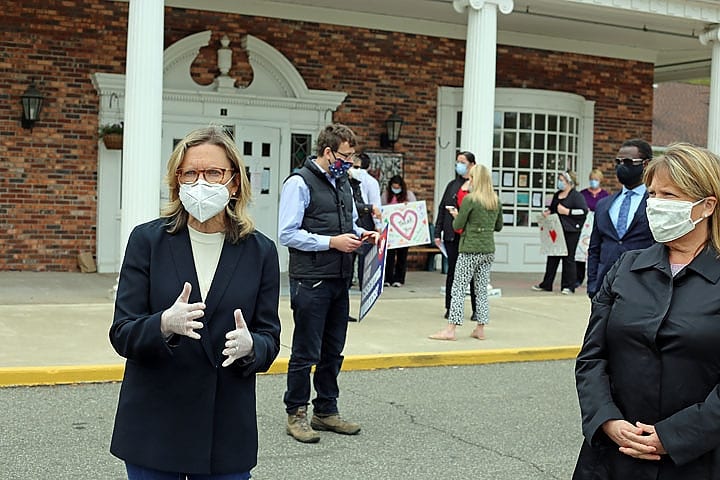As Virus Slows, Advocates Plead For Nursing Home Visits

Audio By Carbonatix

Lawmakers outside of Kimberly Hall North in Windsor back in May. Courtesy of CTNewsJunkie.com
Current policy does not allow for indoor visits, other than ‘compassionate care visits’ at the end of a patient’s life.
By Emily DiSalvo, CTNewsJunkie.com
A coalition of advocates for older adults and people with disabilities is calling on the Connecticut Department of Public Health to allow indoor visits at nursing homes as long as there have been no positive COVID-19 cases in the facility in the past 14 days.
Current policy put into effect since the pandemic slowed in Connecticut allows for outdoor, virtual, and window visits only, which are often infrequent and brief. The advocates say these visits further confuse and upset many nursing home residents who rely on family members for mental health support and peace of mind. In a letter to DPH Commissioner Deidre Gifford Tuesday, 26 individuals and organizations explained how the current visitation policy violates the Nursing Home Reform Act (NHRA).
“Under the Nursing Home Reform Act (NHRA), all residents of nursing facilities, regardless of level of disability, must be provided with services to allow them to ‘attain or maintain the highest practicable physical, mental, and psychosocial well-being,’” the letter reads.
The advocates, which include Connecticut Legal Services and Disability Rights Connecticut, go on to point out that the NHRA also allows for the residents to have visitors at a time of their choosing.
“These rights do not disappear during emergencies and must continue to be enforced by the Department of Public Health,” the letter reads.
DPH officials did not respond to requests for comment.
Because DPH is a public entity under Title II of the Americans with Disabilities Act (ADA), the advocates argue that restricting visits to outdoor-only settings infringes on the rights of those with disabilities and the rights all residents are entitled to under NHRA.
“Some indoor visits are essential because of mobility issues and weather – summer heat, rain, and the inevitable arrival of cold weather,” the letter reads. “We have also heard that the order is being implemented restrictively, with 20 minutes as a maximum, rather than a minimum, period to visit, as intended, in part because staff have to leave the building to supervise these visits. Residents need more contact than that.”
The advocates propose indoor visits at any facility that has not had a positive COVID-19 case in the past 14 days. Visitors would wear personal protective equipment (PPE) provided by the nursing home and maintain social distancing, along with undergoing a temperature check and symptom screening.
Current nursing home policy does allow for some “compassionate care visits” at the very end of a patient’s life, according to Connecticut Long Term Care Ombudsman Mairead Painter. She said that she anticipated DPH would extend these compassionate care visits to other mental health needs last week, but that was delayed by Tropical Storm Isaias.
“The compassionate care visits that we hope to get will be based on individualized need with consultation from their medical professionals,” Painter said. “I do think that will be coming out very soon and that will give people the opportunity to say if their loved one is having issues related to weight loss or things like that, they could work with a physician to schedule a visit.”
Each case would have to be reviewed individually under the plan, unlike the broader changes suggested by the coalition of advocates. For example, Painter said if a patient was experiencing extreme weight loss that could compromise their immunity, a visit may be appropriate because a family member may be the only one who could convince them to eat.
The letter included many patient and family testimonials about the need for in-person indoor visits.
Joseph Echtman, 70, suffers from dementia and is legally blind. Since he was admitted about a year ago, his wife has been visiting twice a day to feed him lunch and dinner.
“Since the facility closed its doors the loss of family contact and grounding has radically changed him,” the letter reads. “The extreme isolation, feeling of abandonment, anxiety and fear have prompted outbursts not seen before. His mental and physical functioning have declined. He no longer walks, has lost motor skills and is not eating regularly, having lost 18 pounds since March 10. He now just sits in a wheelchair 12 hours a day due to his depression.”
Both Painter and the advocates understand the public health implications of nursing home visits. According to state data, there have been five positive COVID-19 tests in nursing homes from July 29 through August 4 – a significant decline from Connecticut’s peak.
“According to the epidemiologists, we’re at a place where it’s an appropriate time to look at that balance and identify when (a visit) is absolutely needed,” Painter said. “They feel that they are always needed and they are. There’s a lot of unknowns. People are worried about a second wave or a continuation of the first wave. There’s no concrete answer and that’s why we want it evaluated by a medical professional. If the doctor feels it’s crucial they have this (visit) we’re hoping that’s when we’re able to identify it’s needed.”
Republished with permission from CTNewsJunkie.com, all rights reserved.
Like what you see here? Click here to subscribe to We-Ha’s newsletter so you’ll always be in the know about what’s happening in West Hartford! Click the blue button below to become a supporter of We-Ha.com and our efforts to continue producing quality journalism.



